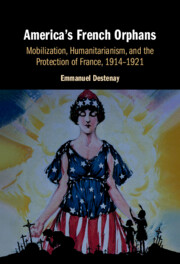‘Modern war created modern humanitarianism, and America’s French Orphans demonstrates the critical importance of volunteer efforts during World War I. Building on research scattered across two continents, Emmanuel Destenay recovers a lost chapter of this crucially important history and joins an exciting new field exploring the humanitarian legacies of World War I.’
Christopher Capozzola - author of Uncle Sam Wants You: World War I and the Making of the Modern American Citizen
‘Emmanuel Destenay complicates the oft-recounted story of World War I’s violence and upheaval by explaining the reciprocal relationship, albeit not always an equal one, between American humanitarians and European actors. Women and children take center stage, not just as passive recipients, but as actors seeking to alleviate suffering on their own terms. This rich social and cultural history rescues a massive system of child relief and adoption organizations from historical amnesia.’
Tammy M. Proctor - author of Civilians in a World at War, 1914–1918
‘By creatively blending the histories of childhood and international relations, Emmanuel Destenay’s rigorously researched account of Franco-American humanitarian efforts during World War I provides us with a new way to understand the era’s transatlantic diplomacy.’
Brian Rouleau - author of Empire’s Nursery: Children’s Literature and the Origins of the American Century
‘… an in-depth and well-researched account of how the FCFS mobilized American donors to ‘adopt’ vulnerable French children during and after the war.’
Margaret Andersen
Source: French History
‘Through this emphasis on children as purposeful agents, rather than simple recipients, of humanitarian aid, Destenay provides us with a rich and deeply moving story, grounded in the voices and perspectives of its protagonists, about a critical moment in the history of American humanitarianism, the history of US-French relations, and the broader history of childhood.’
Anita Casavantes Bradford
Source: The Journal of the Gilded Age and Progressive Era



